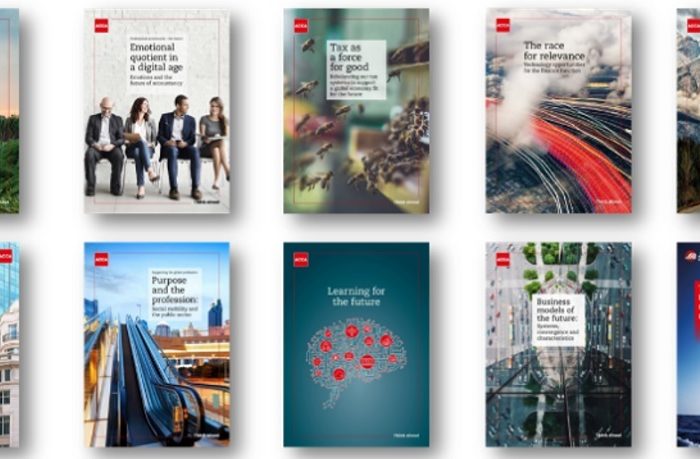Andreia Stanciu, Head of ACCA South-Eastern Europe: A good employer brand has clear values that are adhered to and which are understood by all, internally and externally

What makes a good employer brand? What are key elements that affect an employer’s branding in this period and especially after the complicated year 2020? We talked to Andreia Stanciu, Head of ACCA – South-Eastern Europe to depict some of the most relevant aspects of the employer branding strategy and work culture in 2021.
What makes a good employer brand? What are key elements that affect an employer’s branding in this period?
A brand is so much more than a logo or marketing strapline – a good brand is about living up to a promise about what an organisation stands for and what it says it does. It’s the emotion that is inspired when people encounter an organisation, or see something to do with it.
There are thousands of management books about what makes a good employer brand. But perhaps I can distil this down to it being a brand that has a clear strategy that’s measured and reported on regularly; a good employer brand has clear values that are adhered to and which are understood by all, internally and externally; it is an organisation that has a vision that everyone can buy into; and it’s also one that engages its employees, and encourages dialogue to make change happen.
The key elements that can affect an employer’s brand can be both internal and external. I’ll address here the negative impacts. These could be external risks such as those presented by Covid19 which has meant we have all had to manage uncertainty and turbulence. There could be also be negative impacts when an organisation breaks a brand promise – or something reputationally damaging happening either to the organisation or by the organisation itself – perhaps financial mis-selling, employee fraud or theft, or bad customer service. Basically, it’s any action that damages the brand’s positive image.
How is the Association of Chartered Certified Accountants approaching the employer branding strategy this year? What changed compared to the period before 2020?
Our strategy for employers is to partner with organisations, helping them access and grow the accountants and finance talent they need to succeed through our trusted forward-looking qualifications and continuous learning. Our cutting-edge business and technical insights keep them ahead and our global community opens doors to new opportunities including connections with ACCA professionals, new talent, potential partners and forward thinkers.
What are the biggest challenges facing ACCA currently and conversely what are the biggest opportunities in the current market for you as an organisation?
The biggest challenge is posed by Covid-19. Despite being in existence since early 2020, many countries are still facing a serious public health crisis. This clearly has a knock-on effect for businesses large and small everywhere.
We launched our new five-year strategy in 2020, which we had to review and refine in the face of the pandemic’s threats which presented with us all with unprecedented disruption. Looking ahead, all our insights and analysis points to continuing global volatility and uncertainty. This will continue to create challenges for ACCA and for our community. As a result, we are progressing our 2021 / 22 strategy by prioritising three areas of focus in particular: member support, student progression and a sustainable organisation. These offer us opportunities, which we have to manage carefully.
What are the expectations of employees from a company in your industry in terms of work culture and values?
I think expectations are broadly the same regardless of the sector in which we work. Employees expect fairness, transparency and clear direction. We all expect to be heard and listened to.
Interestingly, we recently looked at the needs of Gen Z in the workplace in a new report called Groundbreakers: Gen Z and the future of accountancy.
This looked at the first digital native generation entering the workforce, which is being shaped by the unique world catastrophes they’ve lived through in their young lives. The views of 9,000 18 to 25-year-olds reveal their primary concerns are around job security, well-being and mental health, offering a wakeup call to employers who need to show they care. They see accountancy as an attractive career – providing long term prospects and portability with access to jobs that span internationally and across industries – but it’s also clear this generation questions business’ integrity. They believe businesses continue to prioritise the maximisation of returns to investors (66%) over taking care of customers (53%) and employees (47%). They are also less convinced that business leaders have integrity and do what they say (41%) and fewer of them believe businesses are currently pulling their weight in fighting climate change (39%).
This research is very relevant for employers regardless of the sector, and that meeting this generation’s needs and addressing their concerns will be essential to thrive. For the accountancy profession specifically, its central purpose to create sustainable value for organisations while acting in the public interest place it in a unique position to harness this opportunity.
What are the company’s and industry’s challenges in terms of recruitment and retaining / attracting talents this year? What do you look for in a new recruit?
The pandemic has impacted many employment sectors, but accountancy is resilient because good financial management and business knowledge are at the heart of sustainable business, government and economies.
Again, regardless of the sector, the recruitment challenges are about finding the right talent and retaining them. I reference our Gen Z report, as it offers advice and guidance for employers, such as tapping into Gen Z’s digital mastery – astute enterprises are seeing Gen Z as fantastic ambassadors and early adopters to encourage the rest of the business to use digital. https://www.accaglobal.com/gb/en/cam/rethinking-careers/advice-for-employers.html
As an employer, what ACCA looks for in a new recruit depends on the role. As a head of a market, I look for strong skills and knowledge, alongside strong personal attributes such as whether someone is inquisitive and be a good team player. Essentially, it’s all about making sure the job description is right to attract the right person.
















